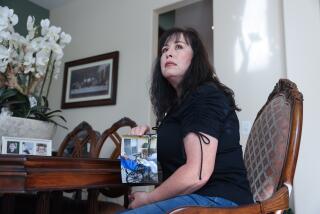Malpractice system not a cure-all
- Share via
No one wants to think about the possibility that something will go wrong — that an error will be made — with his or her medical care. But the fact is, mistakes are inevitable in medicine. Often they’re easily corrected or result in little or no lasting harm. Sometimes, though, they have tragic consequences.
The medical malpractice system provides a way for patients who’ve suffered injuries as a result of medical mistakes to be compensated. Unfortunately, it’s a system that’s seriously flawed. Many patients with legitimate claims never see a dollar of what they’re owed, and many doctors who’ve done nothing wrong are sometimes found liable for enormous settlements.
Legislators are trying to remedy the system with sweeping legal reforms. Some want to cap the amount of money that a victim can receive in a suit; others propose establishing jury-less health courts where judges and neutral experts preside over malpractice cases.
But there are deeper changes that need to take place if the system is truly to be fixed — changes that involve how doctors and patients communicate with one another.
Patients are looking for honest, prompt and compassionate communication from physicians about mistakes, studies find. They are nearly unanimous in their desire to be told about errors, particularly those that cause them harm. They want doctors to explain how and why an error happened and to walk them through what will happen next. Most also want a proper apology.
But revealing errors — and saying “I’m sorry” — doesn’t come naturally to doctors, and they’re often less forthcoming than they should be, even though many believe it’s the right thing to do. A case in point: In a survey published in 2006 in the Archives of Internal Medicine, more than 2,500 doctors were presented with scenarios depicting serious medical errors and asked how much information they’d volunteer to patients. More than half of them said that, while they’d mention the injury itself, they wouldn’t ‘fess up to the error that led to it.
Fear of litigation is one reason that doctors withhold this type of information. “Liability stands as a barrier to full and complete communication,” says Larry Smarr, president of the Physician Insurers Assn. of America, a trade group of medical malpractice insurance companies. But it’s not the only reason. Doctors also worry about losing their patients’ trust, damaging their reputation and undermining their own self-confidence. They also feel that certain patients wouldn’t want to know.
When mistakes are made, there’s an appropriate way to deal with them: Physicians need to come clean. Disclosing medical errors is not only the ethical thing to do, there’s also some evidence to suggest that it may reduce the likelihood of litigation. A study published in August in the Annals of Internal Medicine examined the effects of a full disclosure program on liability claims and costs at a large health system in Michigan. The program required that all malpractice claims against the health system be thoroughly investigated and that any errors discovered be acknowledged and compensated appropriately. There was no increase in legal claims after the program was implemented — in fact, the average monthly rate of new claims fell.
But just as physicians need to take responsibility for their mistakes, patients need to stop blaming doctors for things that aren’t their fault. Thousands of unwarranted — or “frivolous” — malpractice suits are brought against doctors every year. In a 2006 paper, Harvard researchers reviewed more than 1,400 malpractice claims and the associated medical records to judge their merit. The results, published in the New England Journal of Medicine, showed that, although most plaintiffs had suffered a treatment-related injury, more than one-third of the claims lacked clear-cut evidence of a medical mistake.
In a survey of 5,825 physicians conducted by the American Medical Assn. in 2007 and 2008, more than 60% of all physicians aged 55 and older reported being sued at some point in their career, with the percentage rising to 90% among general surgeons in this age group. Obstetrician-gynecologists were found to be at highest risk: Half had been sued before they turned 40.
“Seventy percent of all claims don’t wind up in a payment to the plaintiff. Most of them are dropped or dismissed,” Smarr says. But even claims that lack merit are expensive to defend. Cases that never make it to the courtroom can cost tens of thousands of dollars in attorney fees (not to mention countless hours of lost sleep). A legal defense for a claim that goes to trial typically runs more than $100,000.
What many patients don’t recognize is that bad outcomes aren’t always the result of bad medicine. Nothing goes perfectly 100% of the time in medical care. The vast majority of people who undergo general anesthesia tolerate it well, but a small percentage experience a life-threatening reaction even if the drugs are administered properly. Colonoscopy is generally a very safe procedure, but serious complications — such as bowel perforations and bleeding — sometimes occur unexpectedly. And so on.
Doctors need to be more open, for sure. But patients need to acknowledge the risks inherent in their care and accept that things may not always turn out as well as they’d hope. They need to realize that when things go wrong, there’s not always someone to blame.
It’s often not easy for patients to differentiate bad luck from bad care, of course. And on many levels, the liability system makes distinguishing the two more difficult. It puts doctors on the defensive and undermines patients’ trust, closing down communication at a time when the best medicine would be dialogue.
Ulene is a board-certified specialist in preventive medicine practicing in Los Angeles. The M.D. appears once a month.






